- Home
- Philip MacDonald
The Noose Page 11
The Noose Read online
Page 11
He smiled. But when he spoke there was to his voice the rough edge of worry. He said:
‘If you must know—it’s a link I want. Not the surface link of blackmail, but the one behind that. Tell me something—anything—which could even in the remotest possibility, link Bronson with Blackatter and both—both mark you—with X. Tell me! You can’t. Nor can I … Now out you pop!’ He stretched a long arm across her and opened the door.
They were barely within the house when its owner, brushing aside a manservant, surged upon them.
‘Good of you!’ coughed Colonel Brownlough. ‘Good of you to come! Very pleased. Very pleased.’ He took Lucia’s hand between both his own. ‘So this is your husband, eh? Very glad to meet you at last, Gethryn. Very glad. Heard a lot about you. A lot. Who hasn’t, eh? Known this lovely wife of yours since she was a kiddie. Haven’t I, m’dear? Yes. So high …’
He went on spraying Anthony with talk while Lucia went, shepherded by a servant, to unwrap. He was somewhere, this Colonel Brownlough, between fifty and sixty; a burly man of considerable height and great breadth and thickness, with an agility and lack of fat most commendable.
He stuck to Anthony and went on spraying Anthony, who bided his time and smiled and nodded.
They went from cloakroom to hall, from hall to library. Colonel Brownlough waved a hand at the long white-clothed table, beside it small clusters of guests in which, rather surprisingly for the times, the men outnumbered the women. ‘Glass of wine?’ said Colonel Brownlough. ‘Or anything else you’d rather? What?’
Anthony found himself drinking a Pol Roget of excellence. He kept half an ear for the splashing talk of his host and discreetly used all his eyes and the rest of his hearing for others. What he saw he found to be what he had expected. Perhaps a little more so. The atmosphere of a Hunt Ball without its formality and with a rather larger leavening of militance than is usual at most Hunt Balls. Fully forty per cent of the men he saw were very obviously soldiers, the subaltern predominating.
‘… and so that’s how it was!’ The barking rattle of his host’s voice beat upon Anthony’s ears. ‘No sooner did I enter Betty Marston’s drawing-room than I saw your wife … An’ so here you are at my little tamasha …’ The voice paused for a moment; then dropped to a tone of impressive confidentiality. ‘S’pose,’ it said, ‘you won’t be gettin’ in any huntin’ round here, what? Too busy, eh? Damn fine effort, this o’ yours. Fine!’ The voice went lower still. ‘No business o’ mine o’ course, Gethryn … mustn’t take any offence … just a friendly tip y’know … but that lovely wife o’ yours … well, fact is, thought she talked a bit more than you’d like … what I mean, must be half round the county by this time that you’re makin’ this effort …’
Anthony, restraining his emotions, smiled at his host. He said:
‘Much obliged. A woman’s tongue’s a tiresome thing—nearly as bad as a man’s. But in this case, the more talk there is, the better I’ll be pleased. That, you know, was my wife’s reason for talking.’ His voice, by stages so cleverly handled as to be imperceptible, had been rising. It was now, though unostentatiously, loud; so loud that it would carry—should they care to listen—to any of the other groups at the buffet. He said:
‘I’ve no objection to the whole world knowing. I am, in fact, encouraging all I meet to spread my business here. The more it’s known that there’s a movement to save Bronson because there are people who believe Bronson innocent, the better I shall like it. And the greater the chance for Bronson. Because, as Bronson isn’t guilty, there must be someone who is. And that someone is in this county. And the more Someone hears the more frightened he’ll get, and a Someone afraid’s worth two in a hush … Besides, the revival of thoughts about Bronson might lead to a revival in memories about l’affaire Bronson, and that’d be to the good too. Something—some little, apparently insignificant point—might be remembered for the first time—as Mrs Starbuck remembered the ashplant in the Corson business—and turn out to be the key-piece that’s been missing …’ Anthony allowed himself to become aware, for the first time, of Colonel Brownlough’s now fervid attempts to silence or quieten him. He made almost petulant apology. He shrugged and said: ‘Sorry, sorry! Boring you!’ and plunged into small talk.
But of small talk his host would have none. He cut across it with an apology of his own.
‘Not boring at all! No. Deeply interested, Gethryn. Deeply …’ He moved closer and in hoarse whisper added: ‘Feller just come in. Standin’ behind me now. Ravenscourt. Chief Constable. Very proud of the way the case was handled. Don’t want to upset him. Stout fellah. VC an’ all that. But opinionated. Always right. Sorry if I seemed rude. Doosid awkward …’
Anthony permitted himself to unbend. ‘Not at all. My fault entirely. Talking much too much. And I quite see your point.’ Overtly now, as covertly for the past few moments, he looked at the Chief Constable of the County. He wanted to know the Chief Constable, if the Chief Constable of the County were the right sort. It was impossible, he found, to tell. If Brownlough were right, then no need to waste time in trying to get the man’s help. But Brownlough might be wrong …
His thoughts were past this point when Colonel Brownlough, with spraying apology, left his side—‘just for a moment, Gethryn.’
With half an eye, Anthony watched; saw Colonel Brownlough’s quick, deft preening—a twitch to the tie, a tug to the waistcoat, a one-two, one-two up-brushing of the moustache; saw Colonel Brownlough making erect and swift and by no means ungainly passage towards his objective; saw at once the objective. He studied this for a moment. He saw a flame-coloured, startling island entirely surrounded by Man. A tall woman, but without that seeming of top-heaviness which is the marring of many tall women. A woman whose face and body, whose gown and few jewels, whose self in all guessed and unguessed aspects, not so much demanded attention as spontaneously received attention without the necessity for demand.
Anthony, empty glass in hand, drifted nearer. He set the glass down and, immediately, it was filled. He lifted it, began drifting again; finally settled to drink upon a spot from whence his view was good and less interrupted. He could see her face in detail now. A face, like the whole of her, which held attention. Not a beautiful face; but a face of that undefinable kind which, for good or evil or both of these, far outruns mere beauty in its effect upon mankind. He studied this face; its pallor, its tenseness, its long eyes whose colour seemed not static but ever-changing, its lack of paint except upon the over-full lips which stood out impossibly yet pleasingly scarlet against their background; its hardness which sometimes seemed a mask for tenderness; its gentleness which might be a veil for cruelty.
He was still looking when there came a touch upon his arm and the soft deep voice of his wife to his hearing.
‘You too!’ said Lucia. ‘It is what you’d call an eyeful, though, I must admit.’
Anthony looked down at her. He smiled. ‘Interest’s purely the speculative impersonal. Know who it is? Or what?’
Lucia lowered her voice. ‘The name,’ she said, ‘is Carter-Fawcett, with hyphen. The husband is alive but nearly always absent. I also gather that what money Mr Ford and the Rockefellers haven’t got belongs to her. She’s got a house near here, a few castles in Scotland, a palace in Rome, a flat somewhere W1, a yacht and a racing-stable …’
Anthony interrupted. ‘Got it! Racing-stable did it. I thought the Carter-Fawcett sound was familiar … So she’s that one, is she? Well, well!’
‘Well-well what?’ said Lucia. ‘Why well-well?’ She studied her husband with intentness.
He shrugged. ‘Couldn’t tell you. Have a drink, dear.’ He turned from her to the buffet. When he turned back, a wineglass in his hand, it was to find his wife in speech with their host, now sundered from the Carter-Fawcett group. There were, too, a young woman of the usual prettiness and a younger man, plainly military.
It became clear to Anthony, after mumbled introductions, that he was to dance with, talk to or s
upply with food and drink the young woman. Lucia, the subaltern beside her patently congratulating himself upon his luck, moved off. To Anthony the girl said wistfully:
‘They’re going to dance … Colonel Gethryn, isn’t your wife lovely! Oh, I’m sorry, I shouldn’t ’ve …’
‘Why shouldn’t you?’ Anthony smiled upon her. ‘I know it, but that doesn’t mean I don’t like hearing it. Shall we dance?’
‘Please,’ she said. She had a voice as pretty as herself. Blue eyes looked with frank pleasure at the lean length and quiet splendour of Colonel Gethryn. They walked side by side from the room, weaving a path between clusters of their fellow-guests. To almost every group the girl smiled and nodded. Anthony, his eyes keen beneath sleepy-seeming lids, picked up hope. He said:
‘I’m very sorry. I didn’t catch …’
She laughed. ‘You wouldn’t. It’s Brocklebank. But when Colonel Brownlough says it, it sounds Polish.’
They had come out into and across the hall. Before them the pleasantly-decorated dining-turned-ballroom showed itself. An orchestra of three was playing, softly and with good enough rhythm, the latest foxtrot but three. The floor was crowded with couples. Anthony swung his partner into their midst. They got on quietly but with smoothness. For two complete circles of the big room they did not speak, and then the girl broke the silence. Just as Anthony was about to play his gambit, she said from his shoulder:
‘You must dance an awful lot. And that’s odd …’
Anthony glanced downwards. He could see nothing save the top of a corn-coloured head and a triangle of white forehead. ‘I don’t,’ he said. ‘But where’s the oddity?’
‘I’m very rude, I suppose,’ said Miss Brocklebank.
‘If you are you’re disguising it well.’ Anthony, with a sudden and adroit changing of step, avoided collision with a flame-coloured gown and its inhabitant. Mrs Carter-Fawcett and partner swept on—graceful Juggernauts. Anthony’s eyes for a moment followed their progress.
‘And what,’ said his partner’s voice, ‘do you think of her?’
Anthony looked down again. This time the pretty face of Miss Brocklebank was upturned and in full view; its blue eyes wore a guarded, veiled curiosity which belied the pleasant smiling of the nearly insipid mouth. Anthony said:
‘I daren’t … A cyclonic lady.’
‘Daren’t what?’ Miss Brocklebank was persistent. ‘Think of her? Or say what you think?’
Anthony grinned. ‘Both,’ he said.
Miss Brocklebank started in his arms, and missed her step. She said, in a small and panic-stricken voice:
‘I say! You don’t know her, do you? I …’
Anthony was reassuring. ‘I don’t … Now you tell me something. Why, if I did dance a lot, would there be oddity?’
Miss Brocklebank’s face disappeared again. ‘Oh … just because … because … it wasn’t … I mean it isn’t … I mean it wouldn’t … we hadn’t …’
‘I see!’ said Anthony.
Miss Brocklebank suddenly shook with laughter. But the triangle of forehead was white no longer. She said, in a little rush of words:
‘All I was trying to say was that ballrooms didn’t seem quite the setting for Colonel Gethryn who does wonderful finding-out things … You must think I’m a fool, talking like this. But you see Father and Bobbie—my brother—and I, we’re all very great admirers of yours. Ever since the Hoode case. And when Colonel Brownlough happened to tell Father you were coming here tonight, I nearly jumped out of my skin with excitement. And I badgered old Brownie … Colonel Brownlough, I mean … till he introduced me … Oh damn, they’re stopping!’ And, despite Miss Brocklebank’s annoyance, cease the music did.
‘Clap!’ said Miss Brocklebank, ‘please clap!’
Anthony clapped. There came from the room enough applause. With a sour smile, the orchestra-leader picked up again his drum-sticks. There was a pause while he consulted with his two satellites. There came suddenly to Anthony’s ears, through the clattering buzz of the dancers’ chatter, a voice from close behind him. A male voice which he did not know, deep and harsh and vibrant.
‘That’s the feller, is it?’ said this voice. ‘Don’t like the cut of his jib. Looks a blighter.’
Anthony turned, casually, to see the speaker. He knew, as a man inexplicably will always know in such a situation, that this speech had applied to him. And he had seen, though he had given no sign of seeing, the effect of this speech upon his partner. Miss Brocklebank, good manners fighting a losing battle with emotions, had gone first scarlet, then very pale. And the blue eyes of Miss Brocklebank were torches of angry dislike, darting their flames at the speaker. As he turned, too, he caught a mutter from Miss Brocklebank’s lips; one word, which sounded like ‘Swine!’
Anthony looked, across eight feet of unoccupied parquet, into the eyes of the man who had spoken. This was, he saw, the partner of Mrs Carter-Fawcett; a black-haired, black-browed, sleek, very thick person of an age somewhere between thirty-five and forty. On the upper lip of the almost brutal mouth was a bar of black moustache, below it the mouth was twisted into a snarling sneer which showed a glimpse of white, strong teeth; the nearly over-perfect dress-coat set off a magnificent torso. The black eyes gave back a glare for the green, lazy gaze of Anthony’s.
The music began; a quick tune and a noisy. The violinist had now a saxophone. Anthony, sliding his right arm about the waist of his partner, found that her body was a-tremble. He said:
‘And who’s the black gentleman?’
‘Lake,’ said Miss Brocklebank. She did not open her pretty teeth for the word.
‘Yes?’ said Anthony. ‘Crimson, certainly. Who and what is it?’
‘Captain A. D. Featherstone Lake!’ Miss Brocklebank’s rendering of the title and penultimate name was magnificently scornful. ‘He’s … he’s … one of the Lost Legion—that’s what Daddy calls Her … courtiers …’
‘I see,’ said Anthony. ‘And he’d like to be all of it.’ His eye was upon Lake’s back; it noted the force with which Mrs Carter-Fawcett was enclasped.
‘Vile pig!’ said Miss Brocklebank. ‘And why, why, why say that about you—even if he hadn’t almost bellowed it? Why think it?’ There were now two pink patches staining Miss Brocklebank’s pallor.
They were abreast of the door, and through the door Anthony swung Miss Brocklebank. He looked down, smiling, at her surprise and disappointment. He said:
‘D’you know what we’re going to do? We’re going to drink. And, if it’s all the same to you, we’re going out of the crowd to do it.’
‘I should,’ said Miss Brocklebank with fervour, ‘love it … And I know a good place.’
To this good place, with wine, they went. It was an alcove in the western corridor. As, explained Miss Brocklebank, the conservatory was at the end of the eastern corridor, down the western corridor there was no traffic, not even of the most enthusiastic hand-holders.
They sat in wicker arm-chairs of inviting appearance and repellent discomfort. Miss Brocklebank settled herself. She looked at Anthony and she said:
‘You want to ask me questions, don’t you?’
Anthony smiled. ‘My dear Watson!… Yes, I do.’
‘Fire ahead!’ said Miss Brocklebank.
‘If you know I want to question,’ Anthony said, ‘you know why. In other words, you know what I’m in this part of the world for.’
The blonde head nodded. ‘I do … And I think it’s won …’
‘How d’you know?’ Anthony’s smile robbed interruption of discourtesy.
‘Everybody does. I was told by Daddy. Daddy was told by old Lady Fisher, who met your wife this afternoon.’
‘So that you believe it to be general knowledge … at least in the county with a capital C?’
‘Yes. Anyone that hasn’t heard about it by now certainly will have by tomorrow afternoon … And I’m including the … the … everybody—servants and all. Talk goes quicker, here anyhow, from top to bottom t
han it does upwards.’
Anthony surveyed this girl with approval. He saw now that the usualness of her healthy, ordinary, prettiness was belied by the intelligence of the blue eyes. He said, after a pause:
‘And this party? Everyone under this roof?’
‘Knows as much as I do.’
‘Which is?’
Miss Brocklebank fixed her blue gaze upon her questioner. She said:
‘That you think Bronson wasn’t guilty after all and that because you think so you’ve come down here to try and find some new evidence which’ll save him.’
Anthony considered this. ‘I see. And what’s the prevailing attitude?’
Miss Brocklebank hesitated; thought deeply; said at last:
‘It’s not evenly divided …’ she hesitated again.
Anthony, watching her, laughed. ‘You mean that ninety-nine point five per cent say I’m crazy; and I expect some of ’em would add—Captain Crimson Lake for instance—that if I’m not crazy I’m a-hunger for publicity …’
Miss Brocklebank flushed. ‘I’m afraid you’re right,’ she said. ‘Fatheads!’
‘Lake now,’ said Anthony; ‘Lake interests me. People who dislike me always seem so much more interesting than the others, especially when they say so without being properly introduced. I could, you know, bear to know a whole lot more about Lake.’
Miss Brocklebank pulled down the corners of the mouth which was not insipid after all. She said:
‘He doesn’t belong. He comes here in the hunting season … for the hunting and … and …’
‘And Mrs Carter-Fawcett,’ said Anthony.
She nodded.
‘And he never comes during the non-hunting seasons?’
She lifted white shoulders. ‘Not unless She’s here. And that’s not often except during the hunting.’
‘And our Crimson friend,’ Anthony asked, ‘he stays …’
‘At Weydings … that’s her house. Lovely place, about four miles from here.’
‘Many … er … other guests?’
‘House,’ said Miss Brocklebank, ‘is always full. Not that that means anything … unless it makes it worse. There’s always a platoon or so of the Lost Legion there … Miaou-miaou!’

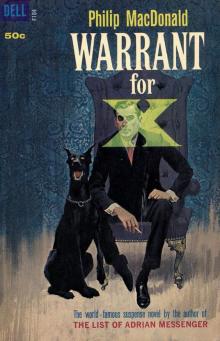 Warrant for X
Warrant for X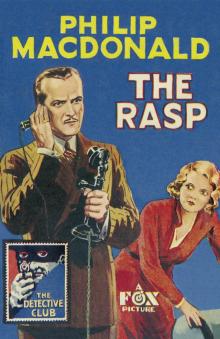 The Rasp
The Rasp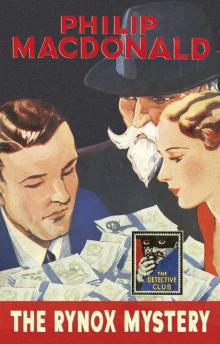 The Rynox Mystery
The Rynox Mystery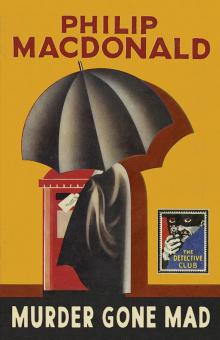 Murder Gone Mad
Murder Gone Mad The Maze
The Maze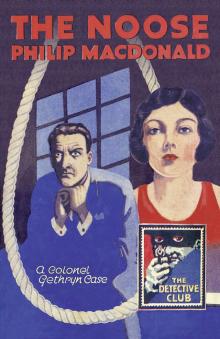 The Noose
The Noose